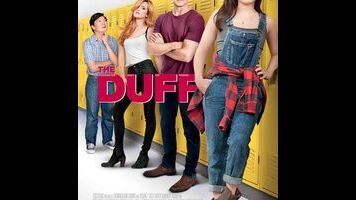The most memorable thing about The DUFF is its ugly-duckling heroine

A DUFF, in the parlance of this movie (and presumably teens—if they weren’t using it before, they’ll be using it now), is the “Designated Ugly Fat Friend” that pretty, skinny girls rely upon to serve as the metaphorical troll guarding the bridge of their affections. That’s pretty harsh, and the ugliness of the sentiment makes it tempting to search for deeper meaning in The DUFF. “What, indeed, is up with the kids and their Instagrams and Snapchats and Vines and whatnot?” one might ask. A better question to ask about this movie, however, is “What is up with the writers of teen movies and their obsession with name-checking apps, an approach that all but guarantees that the film will be dated by the time it hits Netflix?”
Aside from some vague platitudes about loving yourself, the closest The DUFF comes to relevance is the principal, played by Romany Malco, proclaiming that cyberbullying will not stand at his school. This comes after a video featuring our ugly-duckling heroine Bianca (Mae Whitman) “having fun” and “relaxing” by humping a mannequin in public (more on that in a minute) goes viral—buzzword alert!—prompting a wave of semi-anonymous mockery from her fellow students. The consequences of this collective act of cyberbullying is that the kids have their phones taken away, rendering Bianca even more of an outcast. They also get their phones back the next day, so… lesson learned?
The story begins when, one night at a party, Bianca is cruelly informed by her next-door neighbor/childhood friend/obnoxious jock Wesley (Robbie Arnell) that she is the DUFF of her circle. Self-reflection and a little light googling lead Bianca to conclude that her best friends, both of whom are tall, svelte, and fashion-conscious where Bianca is a short, makeup-less horror-movie nerd (one wonders how they became friends, let alone BFFs), are just using her to make themselves more attractive by comparison. So she “breaks up” with them, in a painfully unfunny scene that’s little more than a barrage of social-media references, and enlists a guilt-ridden Wesley to help her overcome her DUFF-ness in exchange for her help passing chemistry. First up is a trip to the mall, where Wesley helps Bianca get fitted for the proper sized bra and encourages her to try on some trendy clothes, an activity that leads to the aforementioned mannequin-humping.
To Whitman’s credit, she commits to the scene, as she does to all of the movie’s ADHD-friendly visual flourishes. This is her film, and she seems determined not to waste her chance at being a leading lady. The supporting cast is unfortunately less convincing—Ken Jeong turns in an uncharacteristically low-energy performance as a sensitive English teacher, and Allison Janney isn’t quite credible either as Whitman’s mother or as a motivational speaker, her ostensible occupation. A blooper reel at the end of the film implies that Jeong and Malco may have engaged in comedic improvisation on set, but those jokes were ultimately cut.
Whitman, who is probably best known for playing Ann (a.k.a. “her?”) on Arrested Development, has made a career for herself playing Hollywood dumpy. That’s a relative term, and even clad in unflattering jean-short overalls (girl, no) Whitman only appears “fat” or “ugly” next to a Gattaca-worthy confluence of genetics like Bella Thorne as bitchy queen bee Madison. But that’s not really the point. The point is that viewers identify with Bianca, who’s actually a pretty cool girl (shout out to the Shock Waves poster on her bedroom wall), and whose relatability is buoyed by the teen-movie staple of extensive first-person narration.
The movie, which is based on a novel penned by then-17 year-old author Kody Keplinger, does explore a few aspects of the teen girl experience—a sequence where Bianca talks about the feeling of invisibility as passersby greet her friends but not her comes to mind—not addressed in earlier generations’ versions of this film. The DUFF is intent on subverting cliché; why else would it make a point of making Wesley as enthusiastic about Project Runway as he is about the NFL? But it does so within the well-defined beats of a personal-transformation narrative, à la She’s All That, and the combination results in a muddied, if arguably more realistic than average, message. (Life is full of contradictions, after all.) Be yourself, but change the way you dress. Teenagers can be horrible and cruel, but are good people if you give them a chance. Internet comments are a cancer, except when they’re positive. Only two things are sure: A properly fitting bra can do wonders for one’s confidence, and Madison will be punished for her crimes. You’ve got to know your audience, after all.